Please, Mr. Tiger
When our parents came to understand, six weeks into your life, that you would not be normal, they thought they might institutionalize you. I know because Mom later allowed me to read something she had written when you were born, a letter. To whom she wrote this letter, I’m not sure, God perhaps. Maybe it wasn’t a letter at all, more of a confession. I do know it was important because it was in typescript. No one in those days typed anything unless it was important, the task otherwise being too time consuming. Our parents knew you were different from the beginning, even if your physical peculiarities had not yet made themselves apparent, your squinty eyes, the doe-eyed gaze captured in some of your photos. I imagine they tortured themselves with questions about liability, though they probably went unvoiced. Was it the water you drank in the South Pacific? Mother might have wondered, Dad staring ahead, patting your little hand. I imagine they said little at all. After Mother died in 2001, I could not locate this document, but I do remember it had contained a prayer, a prayer any young couple might offer if they had given birth to a child Mom innocently called a Mongoloid. Over the years, you were called a variety of things: Retard, a person with Down Syndrome, One of God’s Children. The latter has always struck me as sentimental, removing all human responsibility, including genetic failure to produce a normal child, from the realm of logical explanation. And when our parents were young, they wanted logical explanations. Might they have prayed something like this? We come to you in utter humility, not placing blame but asking what must we do. Will Peggy be able to touch her toes, tie her shoes? Will she know us when we speak? Will she be able to amuse herself for a few minutes? Dare we hope that she might one day read, love, marry?Are these even the right questions, oh, Lord?
How difficult it is all these years later to think of you, Peggy, to scrutinize thoughts and feelings that are as fluid as an amoeba, undulating here as love, there as anger, wiggling across the microscope’s slide as ambiguity. You were one of the first human beings I ever knew. Only twenty-six months apart, we shared beds, blankets, toys, books, clothes, friends, parents and grandparents. Other than Mom and Dad, you were the one I spent more time with than anyone until I was five and our brother Victor arrived.
Our closeness extended to my being able to translate what you were saying to others. Because young children are capable of learning two languages as if they are one, I could understand what you were saying when others stood shaking their heads. Remember you might utter, Nah, ooky, if something didn’t appeal to you? Remember the rubber cockroach on top of the exterminator truck? You thought it bediculous. It was, and I had to explain to everyone what you were saying! There was the time a young black boy came out of a store while we were waiting in the car, and you covered you mouth, saying, Theredchinese, in Weechita? Often you ran your words together like this, so that no one but I understood you. And I not only understood your words; I also came to understand your machinations, if not consciously, then in a visceral way.
For many years I harbored a carefully groomed anger that was like a cat you might toss from your lap—a creature that would not stop grumbling or hissing until peace was made. It brings to mind the weeks-old gray Persian named Baby Girl that Ken and I rescued from under our back porch and bottle fed in 1979. I reasoned that if I could express a normal range of grief over her death, at age eighteen, that docile little furball-maker, I could surely move beyond the hissing anger I directed against you for being you—for being needy and helpless, yet having the sensibility to manipulate others in your helplessness, for having more than your share of problems requiring our parents’ attention. No, I didn’t always like you.
You were born Peggy Lois Jespers on March 30, 1946, in Rome, New York, though our family soon moved back to Kansas, where Mother’s people lived. At this writing you would be sixty-six, one of the earliest Boomers born, along with our cousin Bob, Goldie Hawn, Sally Field, and Presidents Clinton and Bush. Had you married right out of college and bore children, you might now have grandchildren. I might be an uncle to your children; I might even be a great uncle.
I can’t remember much before the age of four or five. Perhaps my hissing cat has arched itself against such memories, perhaps the reason why I’ve been through analysis twice. Oh, that’s where, for one year at age twenty-four, and for two years that ended in 2005, I sat in a psychologist’s chair and talked about our family. With my first doctor, in 1972, we began with Mom, the most important person in a child’s life, according to the doctor, then Dad, then you, and then Victor. You were the hardest to pin down, though at first it was easy to describe your nearly platinum hair, the way your top front teeth overlapped, your wiry body, so unlike your chubby compadres. Your manipulative, spoiled behavior, like that of an indulged overweight Siamese cat.
Perhaps you remember that I used to play with your things. When I was ten or eleven, I derived great pleasure from sashaying around in a pair of toy high heels you received for Christmas. The platform of the sandal was composed of a thin rigid plastic of black, with flimsy elastic straps. The two-inch heels were made of a clear plastic with silver glitter embedded in them. The shoes looked like something out of a fairy tale, and, from the moment you opened the box, I coveted them, slipping them on when no one was looking. My Cinderfella heel jutted out over the edges a bit, but I insisted I could wear them. If only they fit, my life might be transformed; the prince might sweep me up and treasure me . . . not the ugly sister. I snapped the silver strap over my feet and minced across the wooden floor of your bedroom like Marilyn Monroe. I saw that when I wore these magical heels, I really had no choice but to swing my hips like the blonde goddess I was emulating. At one point in my runway fantasy, I tap tap tapped too hard and broke off one of the heels. Oops, I realized, perhaps they were made for dainty little girls after all, even a retarded one. I was sick with regret, even before your first shriek.
“Look what you did!” you said, beginning to cry. Whenever you started, you kept it going as long as you needed to get what you wanted, usually a warrant for my death.
I tried to console you, begging you to be quiet. “Shhh. I can fix it myself. Watch.” All I needed was to align five tiny staples left in the soles with five tiny double holes in the heel from which they had become separated. After some struggle with some sort of tool, while you sniffled and cried, I managed to engage both tines of four staples, but the last one would not go in. Ah, the humiliation, the punishment I would suffer if I couldn’t get this last staple to fit. But it was like that last click of a Rubric’s cube; the staple would not be persuaded to enter. In total frustration, I gave up, and you took the shoe in two parts to the living room.
“See what Dicky did!” you bawled, bursting into the living room.
It wasn’t the first time. You always told, you always cried when I hurt you. And sometimes I got a spanking. That time, however, our parents exhibited a rather matter-of-fact attitude, as if they’d been expecting the shoe police to show up. They’d seen me eyeing your slippers on Christmas morning, sliding my feet in and out of them, my eyeing you—whom they fit, even if they were a bit narrow for your duck feet and gapped toes—as you clopped about the room with as much grace as a chimp. That morning Mom and Dad had told me to stop, that I would break them, but something had made me persist. That same day I had received a beautiful and gender-appropriate Lionel train set. Perhaps Mom and Dad saw this as the answer. Maybe our little Dicky will become an engineer for the Atchison, Topeka, and the Santa Fe. But as much as I enjoyed exerting control over the oval track and eight cars, the black engine that chuffed real smoke, loading and unloading the cars, I coveted your high heels and the spell they cast over me even more. With them I might be transformed from a mere boy to a sleek and desirable creature. I might be loved and cherished as much as you.
Your shoes weren’t the only possession that fascinated me. Why did rolling your doll’s hair—leaving it overnight so that it would dry and combing it out the next day into a lovely coiffure—appeal to me so? I would show you my handiwork, and you would shrug as if you could do better. But you absolutely could not! Your stubby fingers didn’t have the dexterity. Moreover, before the day was over, you had usually grabbed the doll from me and combed out the hairdo I’d modeled after something in a magazine. I felt defeated.
When you tried to duplicate my work, your fingers could not wrap hair around the wiry curlers. “I can’t how,” you would say and throw the doll across the room.
Each year I styled the hair on your dolls until most went as bald as I am today. I derived such pleasure from taking strands of hair, usually blond like yours, Peggy, and rolling them in tiny metal curlers with rubber tips that would lock into place. I tried to mimic the popular styles, giving the doll a bubble coiffure, or, if the wretched creature had enough hair left, a French twist.
But most important, I genuinely enjoyed your company, Peggy, and perhaps these feminine activities were merely a way of being near you, for you were the first to accept me as I was. Perhaps I was the first to accept you, since our parents may have harbored some latent resentment against you. So close in age, where did you begin, where did I end? For me to play with your things was not odd, since for the first five years of my life, we shared toys, including stacks of Little Golden records—which were really banana yellow and not much bigger than a CD.
While I tired of them, you would continue to play them into your twenties or thirties, to the degree that years later Mom would hide them from you or throw them out entirely. When Victor and I cleaned out the basement of our Wichita home, neither he nor I could find your favorite titles from the stacks of records left behind. Playing them had once been one of the few pleasures you had, Peggy, something you could manipulate yourself, placing the record on the turntable and sometimes screeeeeeching the needle across the surface. For a few minutes, you entered another world. One you particularly liked was Little Black Sambo, a story that has now has been thrummed out of existence. The yellow record spun itself at seventy-eight rpms, its needle transmitting a hissing, scratching sound that was unmistakable.
“Ho, ho, ho—ho, ho, ho, I’m going to eat you up,” the tiger would sing, echoing throughout the house, out the windows and into the neighborhood.
“Please, Mr. Tiger, don’t eat me up,” Sambo would say in a high, plaintive voice, “I’ll give you my beautiful new coat.” Or shoes or umbrella.
For hours you would play that record until Mom could convince you of another choice or make you stop for the day. “You’re driving me nuts with that thing,” she’d say, ready to break the brittle record over her knee.
Years later I could recite these lines better than I could recall almost anything from the Bible, even difficult pieces I’d learned for my college organ recitals. Please, Mr. Tiger became my mantra as I entered an exam. In my mind, I would chant these magical words, and the professor would bestow great mercy upon me. The fragments of this incantation might have infiltrated my subconscious for years to come. Please, Mr. Tiger, grant mercy upon me and this filthy, degenerate soul of mine.
You did not seem different from others until the day I tromped off to Longfellow Elementary and realized you would not be accompanying me. In spite of daily contact with normal boys and girls, I was bound to you. Coming home from first grade, I tried to teach you what I had learned that day. Making you sit on the sofa sectional next to me, I opened my reader and attempted to demonstrate, by interpreting the letters on the page, how Spot ran, how Dick ran, how Jane ran, how they romped from one colorful illustration to the next. “See,” I said, pointing to the letters. “R-u-n. Now you try.” I can’t how, you might have said, demurely pulling your lip down with your finger. You might have slipped off the couch and begun to play with something else, kicking your feet into the air like a baby. When you showed no interest in learning what r-u-n meant, I felt as if I had failed. You can learn, if you really want to, I might have told myself. You can how.
There exists a stereotype that persons with Down Syndrome are eternally cheerful, social little people who know no strangers. As with any stereotype, the image is based on a grain of truth, the grain that people choose to believe. You were a happy girl, as long as you were the chronological age of a child; your two years at school were happy ones. There you played well with others; you were involved in numerous stimulating activities. At home you did simple chores Mother asked you to do: folding clothes, setting the table. You were charming if introduced to a family friend. You were like a human pet. As long as you were cute and little, like a puppy or a kitten, things seemed to be all right. However, as you reached puberty, like any adolescent, life became a puzzle for you. One hot evening, at thirteen, you wandered into the living room with a handful of bloodied panties.
“Oh, ye Gods,” Mom shrieked. Then she took your arm. “Come,” she said, guiding you to the bathroom.
Later, Mom shared with me, an eleven year-old, the reason why you had bled. “I didn’t have my first period till I was fifteen,” she said. I was relieved it was something normal, that there was nothing else wrong with you. But Peggy, as your body developed into that of a woman, you desperately wanted to be like everyone else your age. You wanted to date. You wanted a boyfriend, a lover, a husband. No one ever told you that you couldn’t, and some of your habits became worse.
For a long time you had entertained imaginary friends; it often sounded as if your bedroom was filled with people. When asked who you were having such a great time with, you would say, “The fellas.” You would laugh uncontrollably, and our parents would make a joke of it, saying, “Hey, can you and the fellas to keep it down?” Besides, allowing you this eccentricity kept you out of their hair for a while. As time passed, you would develop imaginary boyfriends, apparitions of men you viewed on television: “Kookie” Edward Byrnes on 77 Sunset Strip; David McCallum, “Kuryakin” of The Man from U.N.C.L.E; Troy Donahue of Surfside Six; and many others. You were promiscuous in your efforts to love them all, a behavior I might have modeled as I romped through the seventies. On the floor in front of the television, you would act out the part of the pretty girl, holding up your lips to be kissed, your snaggle-toothed face staring through thick plastic glasses at the television screen, your hair by now a scraggly brown that fell about your face like a shaggy dog. No one distracted you so that you could take part in more wholesome activities. No one helped you find friends of your own. You were left to act as you pleased. So when our family appeared in public, say, in a crowded restaurant, you would continue air kissing your boyfriends, carrying on rather loud conversations with them. You and your entourage would turn out being the evening’s entertainment for more than one family, as your conversations escalated into arguments. Our parents, who’d allowed you to do what you wanted at home, would try to quiet you, embarrassing us all, but they had lost control. As a result, we dined out less and less. In fact, Peggy, we didn’t do a lot of things that other families did.
We didn’t attend church together (Dad, who didn’t wish to go, served as your sitter on cold days). We didn’t go to ball games or any sporting events. We didn’t go to Dad’s Air National Guard parties at Christmas any more. We didn’t invite people to our house. We didn’t go to movies. We didn’t skate. We didn’t bowl. We didn’t have family reunions so large that they had to be held in the park. Except for some landmark trips we made to visit Grandma, when she would come to visit our aunt, we didn’t travel. And if we did, it was a three-day ordeal from Kansas to Washington D.C. Like many other situations, you didn’t travel well. If you weren’t too hot, you were too cold, the compartment too windy. If you weren’t laughing like a hyena with your fellas, you were coughing or crying. If you weren’t talking a mile a minute in the restaurant where we had stopped for supper, you were choking on a piece of gristle in front of a bunch of gawking strangers until your face turned blue.
When I left to go to college, you became even more removed from reality. Mom said that a doctor believed you exhibited schizophrenic tendencies, that all the talk with your fellas existed because you heard voices. Mom could not maintain control over you—making you do chores, making you behave. Even spanking no longer worked, if it ever had. When I came home from college, I shunned the very sight of you. Except once. In 1968, when you were twenty-two, I was twenty, and Victor was fifteen, our family went to Washington D.C. to see Grandma, who was visiting from Holland. On the trip back to Kansas, I caught the flu, and, in my madness, I talked with my mouth full of soda crackers. Crumbs spewed into your face like glitter. You laughed and so I did it again, just to see you laugh like an ape at this cheap vaudevillian trick. It is the last time I remember making you laugh. At one time, doing so had been one of my greatest joys.
As the years passed, Peggy, you laughed less and less. At age thirteen, you became too old to attend the class at MacArthur Elementary, and there were no secondary programs for the mentally challenged, as we say now, in Wichita Public Schools. You could have attended a fairly reputable private institution. But there, students engaged in many physical activities: bowling, basketball, and baseball. As part of your condition, you possessed a heart that did not function well, failing to return properly oxygenated blood to its chambers. Because of this affliction, you would turn blue in situations that were too cold. Neither could you participate in strenuous activity. When you had had sinking spells, the principal at MacArthur would ask Mom to come and pick you up. Therefore, our parents were afraid to place you in the private school, where you might have been overcome by exertion. They decided to keep you at home, an exile that lasted well into your twenties. The situation wore on Mom’s nerves, and, at one point, she even took tranquilizers to cope with one who outwardly aged but whose behavior became more childlike. I used to watch her break one of the capsules in half—I think they were something highly addictive, like Miltown—and toss it to the back of her throat, slugging it down a with glass of water. Until I taught school, subjecting myself to the daily stress of coping with a group of children’s many needs, I wouldn’t understand why she sought tranquility. Indeed, I wondered why, at times, she could be so sweet, and at others, so irritable, so volatile.
After years of residing in this purgatory, you began to attend a day care center for all kinds of disabled adults. Each day Mom would drop you off at nine in the morning, and she didn’t have to pick you up until three. It was a Godsend. You had a place to go each day, interacting with others, though not as well as before. Mom could actually get some work done around the house. She could eat lunch in peace, enjoying a game of Password on TV. She could have six hours without having to think about the person in the next room. Mom sewed Barbie doll clothes on her expensive Bernina for your school’s annual bazaar, and she worked all year long to produce them. If she’d wanted to, she could have charged great prices for these designer clothes—glittering gowns, little fur coats, ski outfits—so sought after was her craft.
I remember in 1982, while I was in Wichita for Christmas, and you had a spell at the center, and the director called for our parents to come and fetch you. Victor and I and Mom and Dad rushed to be near your side. In the car my back stiffened. My thoughts flashed back to elementary school, where I occasionally had run to the cloak room in tears, a teacher or classmate having no idea what had upset me. I recalled in college, having shrieked at a friend, someone I was quite fond of, for reasons I couldn’t later recall. I might have remembered puffing up three times my size, when a pupil of mine would whip me into a rage. I could feel my cat arching its back again. When we arrived, you were laid out on the carpet with a blanket over you, blue as a stillborn baby. You were frightened, your eyes wandering their sockets like those of an injured dog, your breathing labored. Victor and I carried you to the car and laid you flat in the back seat. There was a problem in positioning you, and Mom made a suggestion. I snapped.
“I can’t do shit!” I said, indicating there wasn’t room for me to work.
Mom and Dad had never used language like that, and they didn’t allow us to speak that way, either. But now that I was thirty-four, and, having been on my own for quite some time, the words slipped out, and everyone acted as if it were nothing. But it wasn’t nothing. It was my anger again, slashing the air with its fury. Why don’t you finally put her away? I wanted to scream. You’re going to kill yourselves caring for her. By now Dad had been retired from the Air National Guard for eight years. Our parents had the means to travel, and they were of the age where they should have been able to do so. But no, they were committed to you, you freak, who had outlived your expected life-span by at least five years. Doctors had always said you’d be lucky to see thirty, and here you were nearer to forty. And had I thought my parents wouldn’t hate me, had I been taught to voice my fears, I might have expressed myself honestly. I might have told them to find you a nursing home, but I wasn’t willing to take the chance. I’d never been rewarded for being honest; I’d never been rewarded for being assertive. Why try now?
You never returned to the day care center. At home, though you wobbled a bit when you walked, you reverted to your old routine: record-playing, TV-watching, napping, sassing Mom when she wanted to shampoo your hair. But our parents began to experience even more problems. Upon arising, they would find lamps knocked over, objects broken. They determined that someone would have to sit with you twenty-four/seven and established a routine whereby Mom, a night owl who could read into the wee hours, would stay up while Dad went to bed at ten. You would be put down as usual with a dose of Benadryl. If you woke too early and began to wander, Mom would bribe you with a dish of ice cream and she’d have some, too. She might give you another slug of Benadryl, the effects of which had worn off since the ten o’clock dose. Mom would then go to bed at four, while Dad would rise so that Mom could sleep till ten—each of them receiving about five or six hours of sleep.
I sometimes wonder why a doctor didn’t prescribe a stronger sedative for you. Why didn’t our parents hire a nurse, or (gasp) place you in a nursing home? You, by this time, were on SSI, which would have helped to defray the cost of such care. Each holiday that I saw them, they looked more fatigued than the last, particularly Mom. She was gaining weight, too, with all the late-night snacks. Our parents were short on patience, and their relationship as a couple had come to a halt. For over three years, either Mom left the house alone, or Dad left, but they never went out together. I can’t imagine there was much time for intimacy. Can you?
Then Grandma Richards died toward the end of February, 1986. She was ninety-three. Mom called me, and I drove the 550 miles from Texas to Wichita. Though Grandma had been in the nursing home for fifteen years, and though it was expected she might die at any time, seeing her lie in the coffin, more helpless than you, made me stifle a sob. Dad, of course, was with you in Wichita, not at the funeral, not at the burial in Upchurch Cemetery, thirty miles away. When it was all over, three days later, I drove nine hours back to Lubbock and had barely walked in the door, when Mom called.
“Peggy just died,” she said.
I was stunned, for though you’d looked decrepit at the time of Grandma’s funeral, you’d looked like hobbling death anyway, ever since your spell in 1982. Mom said she had hardly had time to absorb her mother’s death, to grieve for her, when wham, you departed, too. Was it one final bid for attention, one final manipulation to stand in the limelight? When I flunked my master’s comprehensives six weeks later, not accounting for the lack of study throughout this period, I was devastated. Without the help of a therapist, I realized something critical: I’d always minimized my intelligence, so you wouldn’t look stupid. And, as a parting joke, you got me to do it one last time. Instead of taking the fall exam, which I later passed, I insisted I could take the spring exam, setting myself up to fail, to look stupid--the last trick I hoped you would ever play on me. That time I flew to Kansas for your service. That time, Dad did attend; he even cried. Years later, after Mother’s death, he said, “No regrets. We’re glad we had Peggy.”
WEIGHT: 53 lbs. HEIGHT: 49 inches.
SKILLS: Peggy has continued to progress with crayon work. She has more imagination and doesn’t need as much stimulation before getting an idea. She has better control of the paint brush now and tries to create an understandable image. Can cut right on the line with scissors, if she goes slow. Takes great pride in doing it right first. Likes clay better than any other medium. Can manipulate puzzles better this period. Seems to be noticing sizes and forms better. Peggy enjoys dancing, cooking, setting the table, washing dishes, puzzles, games, and looking at pictures. Can talk in detail about what she sees.
ACADEMIC SKILLS: Follows directions very well when given one or two at a time. Peggy has shown remarkable improvement in the area of language development. Reading readiness games, group activities and music have aided in this area. Number readiness games are helping Peggy to gain the real meaning of figures. Also, with the clock, she is making good progress. Enjoys rhythm band and music. Likes to dance. She enjoys singing before the class.
TEACHER’S COMMENTS: Peggy has a fine attitude toward her work. She seems eager to learn. She joins in classroom activities with much joy. Peggy is able to find materials to work with to keep herself busy. This is Peggy’s first year in school. She has made a fine adjustment to new surroundings without any frustration. She has progressed very satisfactorily.
This document portrays you at your best; you were like any human being stimulated visually, intellectually, physically, emotionally. Right under our noses, you blossomed, you flourished.
One afternoon not long after making that discovery, I found myself in my psychologist’s chair. I’d had no intention that day of speaking about you, but somehow my body gave me no choice, finally setting free the snarling cat pent up inside. And, in a fit of crying, forgiveness shook loose from me, gently falling to the floor like feathers from a pillow fight. It was as if every time you’d tattled on me, every time you ever embarrassed me or deprived me of the attention I so badly wanted from our parents—these were suddenly trivialities offered up to the sky, where they dissolved into bits so small you couldn’t see them if you tried. I realized that, except for a few photographs—I couldn’t even locate your birth certificate—your old progress report was the only shred of evidence left to prove you once lived.
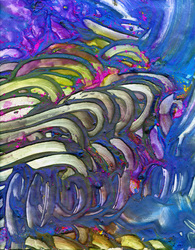
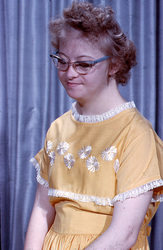

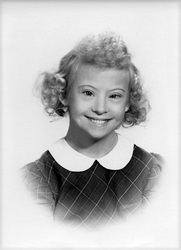
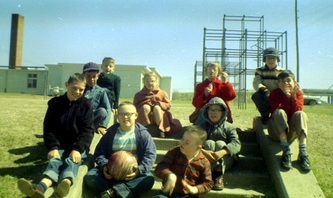

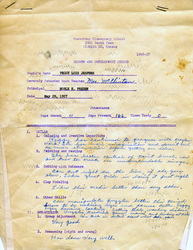
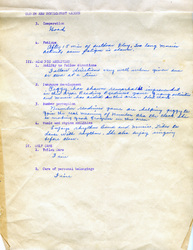

 RSS Feed
RSS Feed